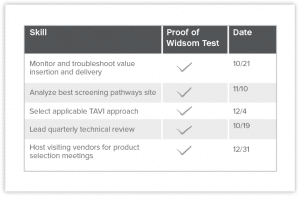One reason we value experts in any organization is for their ability to do great work. We also value them because they are able to answer the questions we have for them with the “right” answer. We all know how great it is to talk with an expert who can quickly decode a problem from their wealth of experience. The difference between experts and apprentices (non-experts) is that they either can’t answer our questions or they may even give us the wrong answer. I know I’m stating the obvious but I’m doing so to make a point: one clear gap between experts and non-experts is their ability to provide good answers to tough questions.
Following that thought, one way to clearly measure knowledge transfer is by tracking an apprentice’s ability to answer difficult questions. If, on Monday, they can’t answer any of the tough questions but on Friday they can answer the questions, and put that new knowledge to work, we have a measure of success.
Below is a list of “test questions” that my consulting firm uses to help mentors and managers track whether knowledge is being transferred to apprentices. These 20 questions have been honed over many years to be adept at checking for both the explicit and the tacit knowledge behind any task. We’ve used these questions successfully with job roles ranging from bank tellers to video game designers to army base commanders.
 The mentor chooses at least five test questions from the above set to create an assessment for each skill an apprentice is learning. The chosen questions are recorded on the apprentice’s master plan for knowledge transfer, what we call the Skill Development Plan (SDP). The mentor and apprentice set a testing date by which time the apprentice should be able to answer the questions and sound like the expert. Leading up to this date, scheduled knowledge transfer sessions occur between the expert mentor and apprentice, and the apprentice also consults other resources (e.g. manuals, templates, wikis, etc.) as available for self-guided learning. The test itself is then an oral Q&A administered by the mentor, who determines whether the apprentice has passed or not.
Here’s a handy PDF of this knowledge transfer test question list for your convenience. For more information, chapters 4 and 7 of my book Teach What You Know discusses in detail choosing and using these test questions. Or, visit related blog posts and pages of this site.
SUMMARY: Give your knowledge transfer process teeth by testing that apprentices have absorbed the knowledge and tacit wisdom needed to perform a given skill on the job. A simple, oral test of tough questions between the mentor and apprentice is a quick and efficient measurement. Use this list of knowledge transfer test questions, which has been honed over the decades, to provide a strong test regardless of the job role.
The mentor chooses at least five test questions from the above set to create an assessment for each skill an apprentice is learning. The chosen questions are recorded on the apprentice’s master plan for knowledge transfer, what we call the Skill Development Plan (SDP). The mentor and apprentice set a testing date by which time the apprentice should be able to answer the questions and sound like the expert. Leading up to this date, scheduled knowledge transfer sessions occur between the expert mentor and apprentice, and the apprentice also consults other resources (e.g. manuals, templates, wikis, etc.) as available for self-guided learning. The test itself is then an oral Q&A administered by the mentor, who determines whether the apprentice has passed or not.
Here’s a handy PDF of this knowledge transfer test question list for your convenience. For more information, chapters 4 and 7 of my book Teach What You Know discusses in detail choosing and using these test questions. Or, visit related blog posts and pages of this site.
SUMMARY: Give your knowledge transfer process teeth by testing that apprentices have absorbed the knowledge and tacit wisdom needed to perform a given skill on the job. A simple, oral test of tough questions between the mentor and apprentice is a quick and efficient measurement. Use this list of knowledge transfer test questions, which has been honed over the decades, to provide a strong test regardless of the job role.
Knowledge Transfer Success Test: The 20 Questions List
Be sure your apprentice is able to explain:- The most common vocabulary words, acronyms, and terms
- The number of steps in the process and why each is important
- The top 3 things that often go wrong when someone is learning this skill
- The relationship between x and y
- How to troubleshoot the three most common problems
- The potential cost of making a mistake while executing this skill/task
- Who is/should be involved/affected/consulted and why
- How to identify and define a “problem” vs. a “crisis” in this area
 The mentor chooses at least five test questions from the above set to create an assessment for each skill an apprentice is learning. The chosen questions are recorded on the apprentice’s master plan for knowledge transfer, what we call the Skill Development Plan (SDP). The mentor and apprentice set a testing date by which time the apprentice should be able to answer the questions and sound like the expert. Leading up to this date, scheduled knowledge transfer sessions occur between the expert mentor and apprentice, and the apprentice also consults other resources (e.g. manuals, templates, wikis, etc.) as available for self-guided learning. The test itself is then an oral Q&A administered by the mentor, who determines whether the apprentice has passed or not.
Here’s a handy PDF of this knowledge transfer test question list for your convenience. For more information, chapters 4 and 7 of my book Teach What You Know discusses in detail choosing and using these test questions. Or, visit related blog posts and pages of this site.
SUMMARY: Give your knowledge transfer process teeth by testing that apprentices have absorbed the knowledge and tacit wisdom needed to perform a given skill on the job. A simple, oral test of tough questions between the mentor and apprentice is a quick and efficient measurement. Use this list of knowledge transfer test questions, which has been honed over the decades, to provide a strong test regardless of the job role.
The mentor chooses at least five test questions from the above set to create an assessment for each skill an apprentice is learning. The chosen questions are recorded on the apprentice’s master plan for knowledge transfer, what we call the Skill Development Plan (SDP). The mentor and apprentice set a testing date by which time the apprentice should be able to answer the questions and sound like the expert. Leading up to this date, scheduled knowledge transfer sessions occur between the expert mentor and apprentice, and the apprentice also consults other resources (e.g. manuals, templates, wikis, etc.) as available for self-guided learning. The test itself is then an oral Q&A administered by the mentor, who determines whether the apprentice has passed or not.
Here’s a handy PDF of this knowledge transfer test question list for your convenience. For more information, chapters 4 and 7 of my book Teach What You Know discusses in detail choosing and using these test questions. Or, visit related blog posts and pages of this site.
SUMMARY: Give your knowledge transfer process teeth by testing that apprentices have absorbed the knowledge and tacit wisdom needed to perform a given skill on the job. A simple, oral test of tough questions between the mentor and apprentice is a quick and efficient measurement. Use this list of knowledge transfer test questions, which has been honed over the decades, to provide a strong test regardless of the job role. 